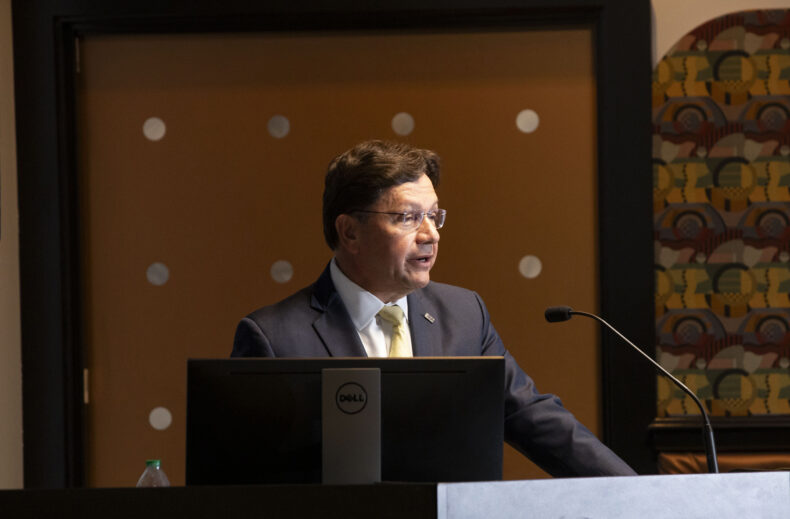The Vanderbilt Department of Pediatrics enjoyed a successful year of impactful work, realizing continued sustained growth in the number of children who received care, while faculty and staff also influenced key research and earned top national recognitions and leadership positions in professional organizations — all achievements that will allow the department to keep moving the needle on children’s health care in 2025, said William Cooper, MD, MPH.
Cooper, delivering his first state of the department address as interim chair, celebrated the department’s successes, strengths and achievements of the past year and looked ahead to the future of pediatric health care. He wrapped his discussion around an initiative called “Accelerate 2025” to portray how today’s accomplishments serve as a roadmap and foundation for the department’s work ahead.
During the address, he focused on Accelerate 2025’s core areas, which include: serving our children, promoting children’s health through discovery and career pathways; ensuring financial fairness; and training the next generation.
“We’re doing really well, and the state of our department is truly outstanding,” said Cooper, Cornelius Vanderbilt Chair in Pediatrics and associate dean for Faculty Affairs for Vanderbilt University School of Medicine. “But we have to keep moving forward. We have work to do. We’re going to spend time as we look at these Accelerate pathways to understand where we are currently, what is our current state, and where might we head.”
The department now includes more than 1,000 people — 456 faculty, more than 250 staff and 434 trainees — to provide care for children in 31 locations across the state and region. How and where the department delivers care also continue to evolve and expand, noted Cooper, the director of the Center for Patient and Professional Advocacy.
“Our footprint continues to grow both across the state and on the main campus. We’re bringing the care where children need it. We are excited to open the Vanderbilt Children’s Primary Care Clinic at One Hundred Oaks. This new space will allow for our first major expansion of subspecialty care in the main hospital,” he said. “Additionally, the 12th Floor of Monroe Carell Jr. Children’s Hospital at Vanderbilt is set to open in spring 2025, opening the door for expanded NICU and acute care space and a state-of-the-art Clinical Research Unit.”
As part of the delivery of care for children, Cooper announced a $1 million endowment to identify pathways — through training, discovery, programming and projects — to ensure all children have access to health care regardless of their circumstances.
Cooper celebrated patient satisfaction scores for the care received from the faculty and staff, noting how those experiences are a direct reflection of the culture established within the department. Faculty delivered care to nearly 300,000 children over the past fiscal year.
“Look at all the people who performed at the highest levels in patient satisfaction. Look at the difference they’re making and how their patients experience the compassionate care that everyone delivered. This is phenomenal, but also reflects the culture that each of you creates that makes that happen for our patients,” he said.
In training and education, Cooper applauded the work to train the next generation of pediatric leaders while emphasizing the need to further draw more people to choose pediatrics as a medical career. Currently, the department has 126 residents, 39 interns and 93 clinical postdoctoral fellows. There are also 227 medical students who have gone through the pediatrics clerkship.
To mentor many of those trainees and young physician-scientists in the pediatrics pipeline, he announced the newly established Dr. Kathryn Edwards Society, which, made possible by the generosity of individuals, is dedicated to cultivating and mentoring early-career investigators in pediatric research.
Speaking to child health discovery and the extramural funding to investigative work, Cooper said the department again set an all-time high in total extramural funding awards, with more than $118 million from all federal and nonfederal sources. The Blue Ridge Institute for Medical Research ranked the department No. 6 on its annual list for National Institutes of Health grant funding for departments of pediatrics within academic medical centers.
In his closing, Cooper stressed the importance of continuing to be aligned across teams, specialties and in conjunction with Monroe Carell leaders to make a collective impact in the coming year.
“As we think about serving each child, supporting the team and seeking change using the things we’ve talked about today across all these areas, the state of the department is outstanding today, but the future of the department is in all of our hands,” Cooper concluded.












